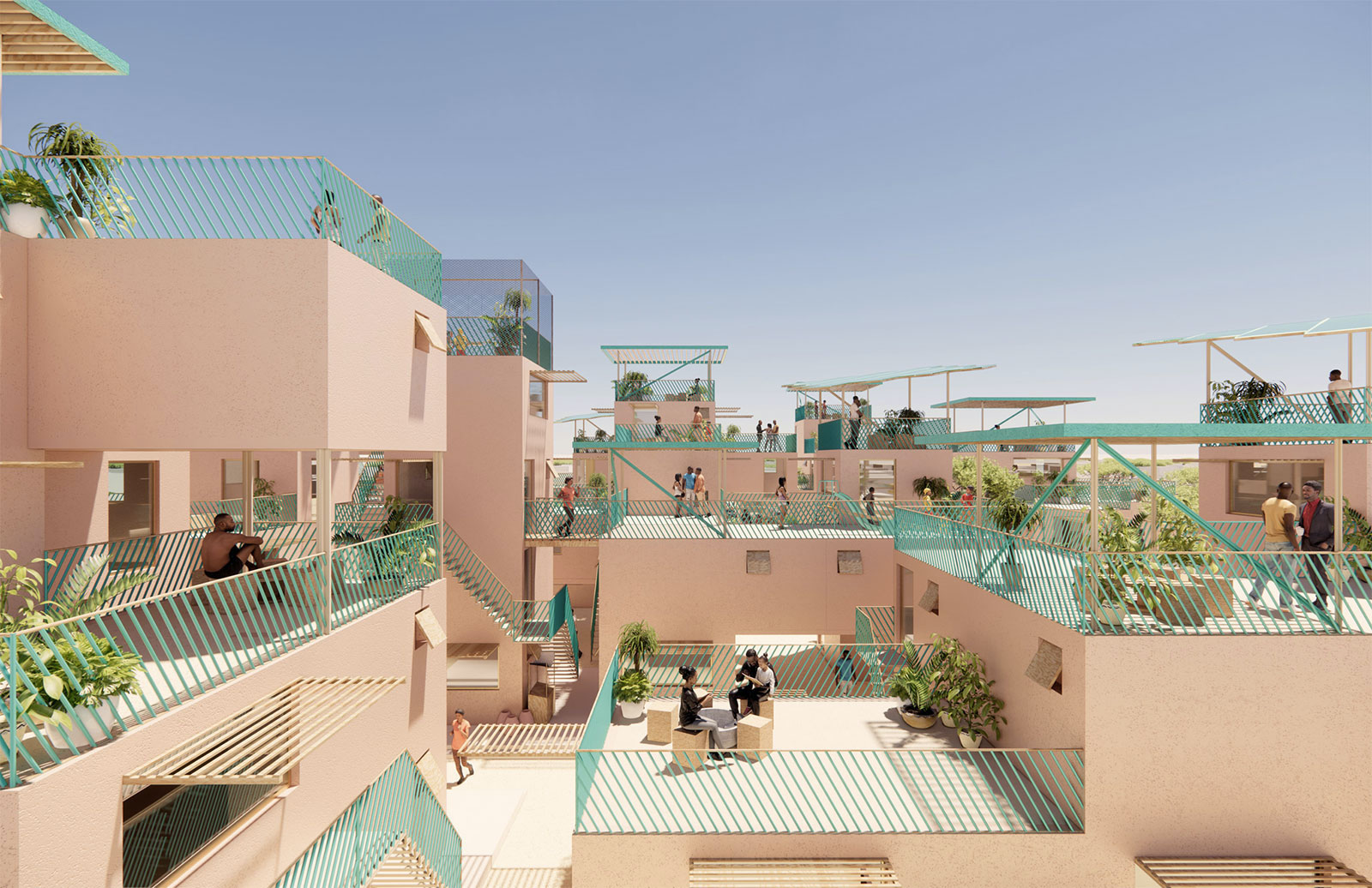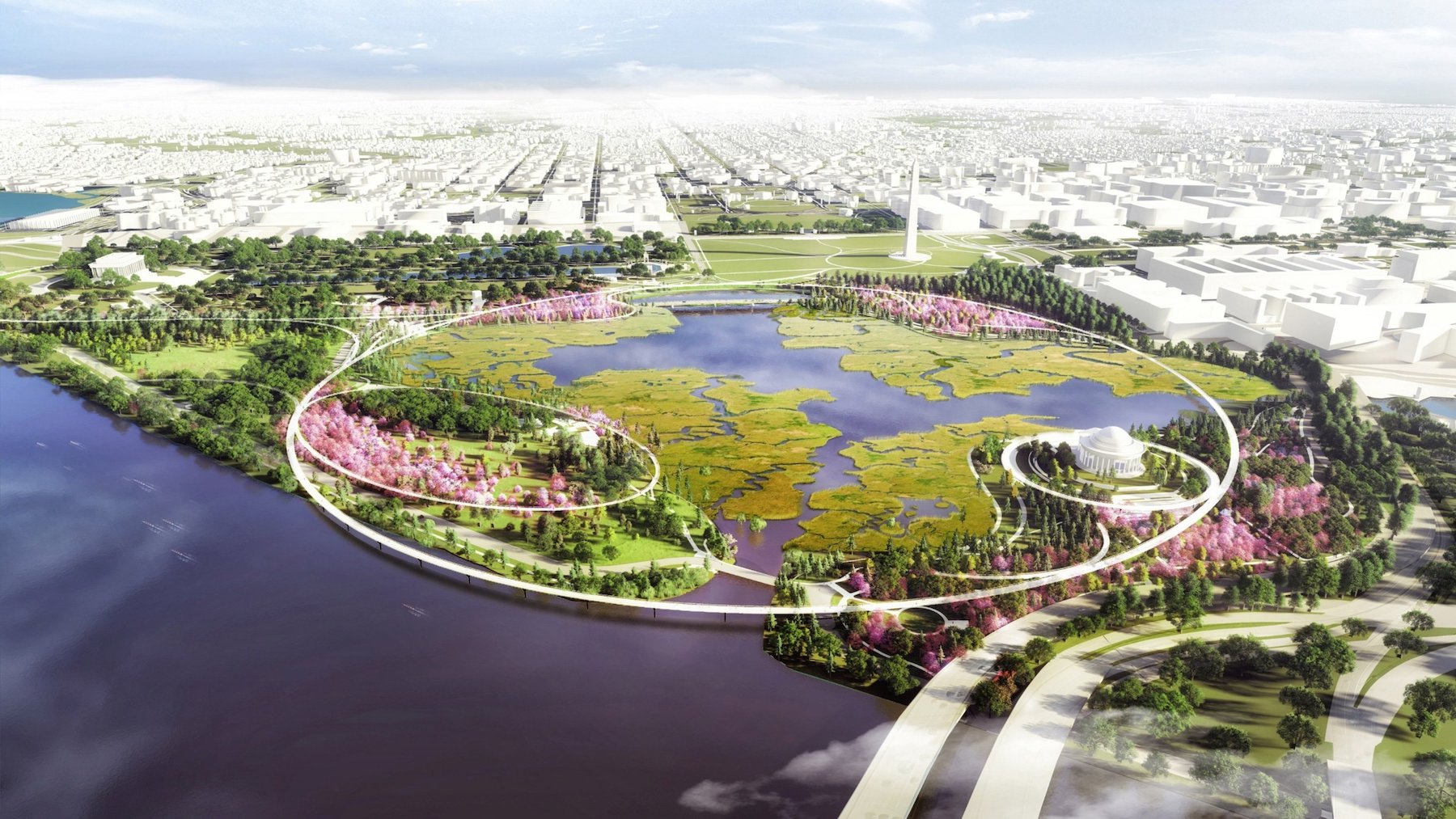The Design Dispatch offers expertly written and essential news from the design world crafted by our dedicated team. Think of it as your cheat sheet for the day in design delivered to your inbox before you’ve had your coffee. Subscribe now.
A Norwegian startup will turn plastic waste into affordable homes in sub-Saharan Africa.
The Norwegian startup Othalo has teamed with UN-Habitat and architect Julien de Smedt to bring low-cost modular homes to sub-Saharan Africa. Constructed from more than eight tons of recycled plastic waste, each two-level unit is outfitted with covered roof terraces and balconies that provide ventilation and seamless indoor-outdoor connections. De Smedt speculates that the construction method can potentially answer a shortage of building materials in parts of the world that suffer from housing shortages. With production set to begin in 2022, the group further estimates that there’s enough plastic waste in the world for a billion homes and possibly other structures such as schools and hospitals.
Grace Farms is launching a movement to end forced labor in the built environment.
The Grace Farms Foundation, a nonprofit based in New Canaan, Connecticut, has released a report that calls to eradicate modern slavery in the architecture, construction, and design industries by addressing the systemic use of forced labor within building materials supply chains. Called “Design for Freedom,” the report offers analysis into how slavery is cemented into the foundations of the building industry. More than 60 industry professionals have backed the effort, which also includes partnerships with leading universities to educate the next generation of architects and designers on the issue.
“Examining our building materials supply chain is a moral and legal imperative,” says Sharon Prince, the CEO and Founder of Grace Farms Foundation, who struck up the idea for the report with The Architect’s Newspaper’s late editor Bill Menking. “Almost all modern construction projects are subsidized with slavery due to unchecked forced labor that permates thousands of raw and composite materials sourced both locally and globally. While initial attention is concentrated on developing ethical labor practices on construction and job sites, we now seek to extend these regulations to the building materials supply chain, including oversight of sub-contractors, manufacturers, and commodities-level providers in such areas as forestry, fiber, and mining.”
Five landscape architecture firms imagine a revitalized Tidal Basin in Washington, D.C.
Five American landscape firms have submitted proposals to revive Washington D.C.’s flood-prone Tidal Basin, the man-made reservoir known as “America’s front yard” that hosts some of the nation’s most cherished monuments, including memorials to Thomas Jefferson, Martin Luther King Jr., and Franklin Delano Roosevelt. “With over 36 million visits annually, the National Mall is the most visited national park in the country,” says Catherine Townsend, president and CEO of the Trust for the National Mall, part of the team behind the competition dubbed Tidal Basin Ideas Lab. The five proposals, coming from the landscape design firms DLANDstudio, GGN, James Corner Field Operations, Hood Design Studio, and Reed Hilderbrand, are now available for the public to view and provide feedback as part of a digital exhibition.
Ahead of the holidays, Apple is expanding its new “Express” barrier-protected retail format.
When the coronavirus pandemic first broke out, Apple rolled out a retail format designed to offer a safely distanced experience: curbside pickup, plexiglass-protected sales counters, and a team of on-site medical experts. But as Covid-19 cases continue to spike in parts of the country, the retailer will reportedly introduce its “Express” format to an even greater portion of its 271 United States stores. Not only does it provide a quicker way to serve customers, says Deirdre O’Brien, Apple’s SVP of retail and people, but it “allows us to maintain all the appropriate social distancing and health protocols within our stores.” That’s good news for the tech brand, which forecasts roughly five percent fewer holiday sales for its iPhone, the latest model of which will arrive one month later than usual because of pandemic-related development delays.
The Metropolitan Museum of Art says the name of its Sackler Wing is currently under review.
After an $8.3 billion settlement in which the Sackler family agreed to pay $225 million in civil penalties, the Metropolitan Museum of Art has announced that the name of its Sackler Wing is currently under review. The art world is continuing its reckoning with the philanthropic family, whose company, Purdue Pharma, recently pleaded guilty to criminal charges over its marketing of the addictive painkiller OxyContin. Though the museum pledged to stop accepting Sackler money in 2019, it reportedly had no plans to change the name of its Sackler Wing until now. The decision follows news that New York University’s Graduate Biomedical Institute at the Langone Medical Center would remove the Sackler name.
Today’s attractive distractions:
This “no stacking” pyramid topper for fragile packages is great in theory.
Yves Béhar designs sunglasses made out of plastic waste from the ocean.
Dries Van Noten’s new Los Angeles outpost abounds with global artworks.
The artist Pejac finishes three murals that honor Spain’s frontline workers.



